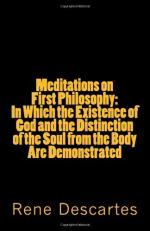It is preposterous and foolish to criticise upon this great work. The defects that happen to be in it proceed either from the free and disorderly will of man, which produces them by its disorder, or from the ever holy and just will of God, who sometimes has a mind to punish impious men, and at other times by the wicked to exercise and improve the good. Nay, it happens oftentimes that what appears a defect to our narrow judgment in a place separate from the work is an ornament with respect to the general design, which we are not able to consider with views sufficiently extended and simple to know the perfection of the whole. Does not daily experience show that we rashly censure certain parts of men’s works for want of being thoroughly acquainted with the whole extent of their designs and schemes? This happens, in particular, every day with respect to the works of painters and architects. If writing characters were of an immense bigness, each character at close view would take up a man’s whole sight, so that it would not be possible for him to see above one at once; and, therefore, he would not be able to read—that is, put different letters together, and discover the sense of all those characters put together. It is the same with the great strokes of Providence in the conduct of the whole world during a long succession of ages. There is nothing but the whole that is intelligible; and the whole is too vast and immense to be seen at close view. Every event is like a particular character that is too large for our narrow organs, and which signifies nothing of itself and separate from the rest. When, at the consummation of ages, we shall see in God—that is, in the true point and centre of perspective—the total of human events, from the first to the last day of the universe, together with their proportions with regard to the designs of God, we shall cry out, “Lord, Thou alone art just and wise!” We cannot rightly judge of the works of men but by examining the whole. Every part ought not to have every perfection, but only such as becomes it according to the order and proportion of the different parts that compose the whole. In a human body, for instance, all the members must not be eyes, for there must be hands, feet, &c. So in the universe, there must be a sun for the day, but there must be also a moon for the night. Nec tibi occurrit perfecta universitas, nisi ubi majora sic praesto sunt, ut minora non desint. This is the judgment we ought to make of every part with respect to the whole. Any other view is narrow and deceitful. But what are the weak and puny designs of men, if compared to that of the creation and government of the universe? “As much as the heavens are above the earth, as much,” says God in the Holy Writ, “are My ways and My thoughts above yours.” Let, therefore, man admire what he understands, and be silent about what he does not comprehend. But, after all, even the real defects of this work are only imperfections which God was




